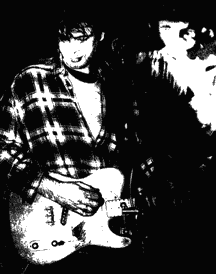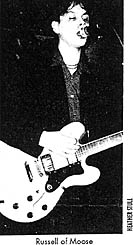| REVIEWS-LIVE . . .
A
new Re:View at pennyblackmusic
 Moonlight Club, London, March 2, 1991 Moonlight Club, London, March 2, 1991
There's a moment in "Miller's Crossing", the greatest film of the year, where Tom, the hero, tells Verna, his mistress, that he once dreamed he was walking in the woods when the wind blew off his hat. "And you chased it, right?" she says. "You ran and ran and finally you caught up with it. Only it wasn't a hat anymore. It had changed into something else--something wonderful."
"No," he answers wearily. "It stayed a hat. And no, I didn't chase it. I watched it blow away. Nothing more foolish than a man chasing a hat."
Something about Moose, a poignantly graceful band named after an ungainly creature with antlers so big and flat you could eat dinner off them, evokes the same feelings as that scene--the indefinable sense of loss, the stubborn refusal to let themselves go, the weird beauty that clings to them anyway. You look at Moose and you see four men in a caccoon, protected by the noise that hangs over them like a cloud, keeping a distance between the blurred, gentle undertow of their songs and outside intrusions.
Each of the players has his own type of shy stillness, Jeremy swaying back and forth with his feet welded to the floor, Russell, the singer hunched over his guitar, muttering into the microphone. He bears an unfortunate resemblance to David Gedge, but with a kind of baleful vulnerability that verges on the irresistible.
They start with "Jack" - "We almost laughed/We almost cried" - a typical balancing act between the infinitely pleasing tug of the melody and the screeching feedback that rises to the surface like a cry for attention. They also have a primitive slide show behind them, sort of Western saints and Eastern erotica - somehow it works.
They can rock, but for the most part they remain strangely ambient, standing there so contained, making music to dream to, steeping the listener in a kind of mellow euphoria. The songs may well be about a darker side of love, or even about existential dilemmas, but the words are swallowed up in the wash of sound. Tonight all the songs are as moving and meaningless as the sea. And if "Ballad of Adam and Eve" makes me imagine extinct birds with leathery wings wheeling over empty canyons, and "I'll Take Tomorrow" reminds me of Technicolor endings, that's my problem.
Thirty (cruelly short) minutes of Moose is a year's worth of space, meditation and deliberately po-faced delight. It's music to chase your hat through the woods to. Beautiful.
--Caren Myers, Melody Maker
From Camden Underground, London England 2/19/93
What a surprise. This was not the sound of a defeated band, dropped form their record label and about to five up. After releasing a single on their own label, Moose really showed me and the crowd something, by seizing the show right from the opening moments and never letting up. From Little Bird to their cover of Everybody's Talking, the three guitar attack got more spindly, sharp, cloudy and foggy at the same time, and the singer Russell's wide eyed heart is so much in evidence, gliding above the dense guitar storm, that they were convincing as hell. The sort of unexpected triumph that leaves one buzzing long after. Why aren't all bands this good live! Why don't more bands seem like they know how great they are and back it up!
---JACK RABID, the Big Takeover
 Camden Underground, London
Melody Maker, March 13, 1993 Camden Underground, London
Melody Maker, March 13, 1993
I had Moose tagged and bagged as a grown-up Ride, an English country-pop band, shy yet inspired, hung up on classic American folk influences. There's no doubt the album, "...XYZ", witnessess a superior pop band emerging.
Moose turn out to be art and craft people. The art is in the simplicity of the lyrics and tunes, the craft is their guitar prowess, which is not so much intense as deliciously intricate.
I don't know about the latest single, "I Wanted to See You to See if I Wanted You". Appropriately, I guess, it's the most frantic, but what's really bewitching here are the guitars and their circular, very feminine rhythms.
And I like Russell's sophisticated reference points (such as Fred Neil's "Everybody's Talking At Me"). His love songs are oblique. They're about conversations and frustrations in-between the sex. To combine ingenuousness and cool demands some element of anger and cynicism. Russell seems to manage it without creasing his navy blue suit.
I reckon in conversations he whispers so people will listen. Certainly, he's the only person I know who can wear a suit and still convince me that he cares about the world being a better place, that he loves his girlfriend. Moose are intelligent escapism. They'd have you believe that they tune their guitars to early morning bird song.
I only wish I'd brought along my boyfriend and held hands.
From NME
Honey Bee was the most wide-eyed, carelessly radiant, most uncynical LP of 1993, a record fluent in its own new fledged wonder. And tonight, tonight they blossom.
Seeing them live is like stepping out to discover the first day of summer. You can feel the sudden, all-pervading clarity, as the thrill of revelation tips over into the headrush whirl of nostalgia. Imagine Tindersticks' hallowed byways with all the darkness quenched, where the ghosts have given way to open vistas, like the territory of the heart finally laid out to view.
Moose songs always relapse into a state of unspecified expectancy, a passive hedonism that wants to drink the world in at its own lactic pace, to be gratified beyond time's distinctive, nearsighted demands.
---NME
 Moose toured the North American east coast with the Cocteau Twins: read about a show in Philly. And here is a scan of the tour t-shirt. Moose toured the North American east coast with the Cocteau Twins: read about a show in Philly. And here is a scan of the tour t-shirt.
Moose with Cocteau Twins and Luna at Roseland, 3/11/94
Moose's two LPs are imports, and no American majors are known to be interested, so there was little prospect of any US gigs. Hah! About as likely as a Syd Barrett gig! But thanks to the generosity of the headlining Cocteau Twins (who rarely tour), not only did Moose get to play here, but they played some huge shows. Completing the East Coast leg of the Cocteau trek, this well respected London quintet enjoyed powerful sound systems and excellent monitor, meaning their three guitar tapestries sounded delicious. On such gorgeous singles as Little Bird and I Wanted to See You to See if I Wanted You, electric guitars dripped with delay and distortion (plus one acoustic continuously strummed).
Singer Russell Yates is a pleasing, attractive front man, his voice calmly imploring and as stylish as his clothes. Meanwhile, the Fong brothers (bassist Lincoln Fong has done some engineering on Cocteau Twins records, which obviously helped Moose's cause, though an awfully friendly Liz Frazier was spotted bouncing happily offstage during both Moose's and Luna's sets) have an obvious exuberance that won applause from the 3000 people there, a crowd clearly unfamiliar with the band or their material.
It was too short - the first band of three being restricted to 30 minutes - but it was more than US fans could have expected, much less sounding this big and clear. (Roseland is not exactly some poxy dive with a broken down P.A.) while is lasted, it was a little bit of atmospheric guitar pop heaven.
---JACK RABID, the Big Takeover
Moose with Cocteau Twins at the Roxy, Atlanta, 3/5/94
Moose, a UK band led by Russell Yates, did a terrific opening set. Like the Cocteaus, Moose set acoustic guitars and drums loose under melodies and chords that combined to yield a disjointed
flow. But where Frazier shot the grain of her voice against the instrumental music. Yates more of less strolled through Moose's. Like the Cocteaus, however, everything was very strategized and British with little straightforward rockin' down the highway - just what this Atlanta crowd craved.
---Rolling Stone, 4/21/94 Issue 680, p30
Thanks to T.T. for copies of these reviews plus the t-shirt scan, and to
Jack Rabid/the
Big Takeover for permission to reprint.
|












 Moonlight Club, London, March 2, 1991
Moonlight Club, London, March 2, 1991 Camden Underground, London
Melody Maker, March 13, 1993
Camden Underground, London
Melody Maker, March 13, 1993 Moose toured the North American east coast with the Cocteau Twins:
Moose toured the North American east coast with the Cocteau Twins: